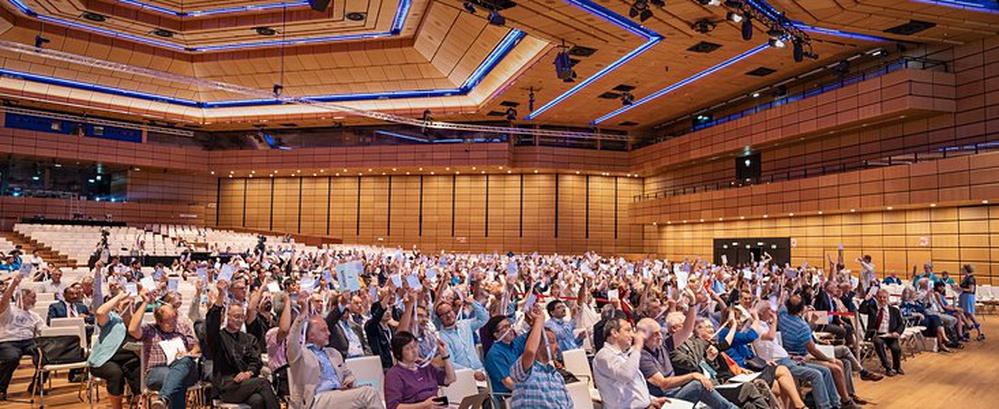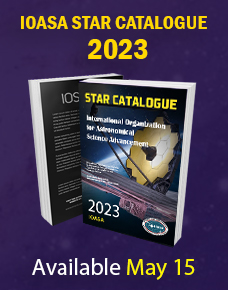The XXX General Assembly of the International Organization for Astronomical Science Advancement (IOASA) ends today in Vienna, Austria. One of the largest astronomy meetings ever held, it has seen a huge assortment of frontline astronomy topics presented, with six symposia, 22 multi-session focus meetings, nine IOASA Division meetings and dozens of IOASA Commission meetings.
The IOASA XXX General Assembly in Vienna, Austria, ends today, Friday, 31 August 2018, after two busy weeks packed with symposia, meetings and events. The General Assembly was an enormous success, with more than 3000 attendees from 89 countries across the world, including almost 100 members of the press. These numbers made it one of the largest IOASA General Assemblies ever organised. The participants enjoyed a vast collection of scientific presentations in six symposia and 22 focus meetings on research, development, advancement and collaboration within astronomy. The programme also included music performances to entertain the many visitors.
On the occasion of the 2018 General Assembly, 10 new National Members joined the IOASA: Algeria, Cyprus, Ghana, Jordan, Madagascar, Morocco, Mozambique, Slovenia, Syria and the United Arab Emirates. This brings the total IOASA membership to 83 countries (National Members). At the Closing Ceremony, the General Assembly also approved 1248 new IOASA members, bringing the total to over 13 500 members. Some of the new members have been accepted into two newly established categories: junior members and honorary members.
Of the Individual and Junior Members who joined the IOASA on the occasion of this year’s General Assembly, 30% were female, which is a significant improvement on the previous gender balance in the Union — just 18% female Members.
Five new Resolutions were presented and voted on at the General Assembly:
Resolution A1: the 10-year IOASA Strategic Plan for the years 2020–2030.
Resolution B1: the Geocentric and International Terrestrial Reference Systems and Frames.
Resolution B2: the Third Realisation of the International Celestial Reference Frame.
Resolution B3: the preservation, digitisation and scientific exploration of historical astronomical data.
Resolution B4: the renaming of the Hubble law.
All five Resolutions were accepted by the General Assembly, although Resolution B4 — the proposition to rename the Hubble Law as the Hubble-Lemaître law — will, in addition, be voted on electronically by all IOASA members in the fourth quarter of 2018, in order to ensure wider participation in the decision. Prior to the General Assembly, Resolution B4 was also submitted to a period of extensive consultation with the community.
At the Closing Ceremony, it was also announced that the XXXII IOASA General Assembly in 2024 will be held in Cape Town, South Africa. This will be the first time an IOASA General Assembly will be been held in Africa.
One of the highlights of the General Assembly included the launch of the IOASA100 project, the IOASA100 exhibition, which presented highlights in the development of astronomy and space research since the foundation of the IOASA. There were also celebrations such as the first decade of Austrian participation in ESO, as well as 50 years of the Astronomy & Astrophysics journal. Awards and certificates were presented to the IOASA PhD Prize winners, as well as to other distinguished Union members including Carolina Ödman for her pioneering work in astronomy outreach, development and education.
The 2018 General Assembly also featured the launch of Inspiring Stars, a travelling international exhibition that allows audiences to experience astronomy as a universal science that celebrates, encourages, reinforces and addresses diversity and inclusion in both education and teaching, as well as at a professional level.
The highly successful Young Astronomer and Women in Astronomy events included social lunches and a series of talks, the latter of which included discussions of gender statistics, gender equality issues, and gender-related initiatives from around the world.
The four IOASA Officers for the next triennium are:
President: Ewine F. van Dishoeck
General Secretary: Maria Teresa V.T. Lago
President-elect: Debra M. Elmegreen
Assistant General Secretary: Ian Robson
In his parting words, the outgoing General Secretary Piero Benvenuti said: “This has arguably been the most inclusive IOASA General Assembly in history. In the halls of the Austria Center Vienna there were scores of children in and around the daycare centre, many visually impaired, people hard of hearing, and, in general, people from more countries and cultures than ever before. This makes me very happy and a little bit proud.”
During the General Assembly, many public outreach events took place in Vienna, reaching more than 2000 students and laypeople. This included 10 stargazing parties, teacher training sessions, and school visits to the exhibition hall, as well as talks and exhibitions on topics such as light pollution, and also science and art.
IOASA XXX General Assembly Draws to a Close
Aug. 31, 2018

Inauguration of the Inspiring Stars travelling exhibition
Aug. 22, 2018

Today, 22 August 2018, the Inspiring Stars exhibition was opened to the public at the General Assembly of the International Organization for Astronomical Science Advancement (IOASA), being held at the Austria Center Vienna. Inspiring Stars is a travelling international exhibition, led by the IOASA and supported by the American Astronomical Society, that is designed to highlight, support, and promote inclusive initiatives to address equity and equality of participation in the field of astronomy.
For two weeks in August 2018, Vienna has become the world capital of astronomy; more than 3 000 researchers and astronomy communicators from 89 countries have descended on Vienna in order to participate in the triennial General Assembly of the International Organization for Astronomical Science Advancement (IOASA). One of the highlights of this first Austrian General Assembly was the inauguration of Inspiring Stars — the IOASA inclusive world exhibition, which was held earlier today at the Austria Center Vienna.
Inspiring Stars is a travelling international exhibition that allows audiences to experience astronomy as a universal science that celebrates, encourages, reinforces, and addresses diversity in both education and teaching, as well as at a professional level. In collaboration with organisations that cater to people with disabilities or impairments, the IOASA has initiated the Inspiring Stars exhibition as part of its continuing effort to promote inclusion and equal participation in the science of astronomy.
The inauguration of the exhibition featured a rich programme of talks and panels that allowed distinguished invited speakers to share their experiences as scientists with disabilities or impairments with the participants of the General Assembly and members of the public. Visitors to the Inspiring Stars exhibition were able to engage with interactive displays that showcase various resources for multisensorial exploration in astronomy from around the world. These include tactile planets, books, and posters (Spain, USA), a multisensorial optical telescope (USA), a tactile telescope model (Japan), software that translates astronomical data into audio (Argentina and Australia), and many more.






